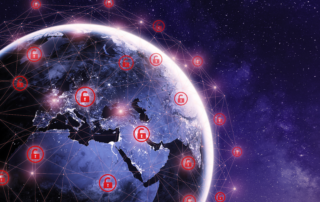One of the key parts of any business is its supply chain. A supply chain is made up of various vendors that supply raw materials and transport completed products to warehouses or directly to the customer. Supply chains typically include a variety of different vendors. Even companies that only offer services, such as medical offices, will have a supply chain that provides them with everything from basic office supplies to specialized products. Some large manufacturers may have several hundred thousand vendors in their supply chain.
Unfortunately, with so many vendors in a supply chain, it can be difficult to do due diligence on each of them. It becomes even more of a task when a supply chain vendor has a supply chain of their own, with second and third tier vendors. You may purchase finished materials from a vendor, but that vendor has to obtain the various raw materials and equipment needed to create those finished items from their own supply chain. While you may vet the vendor you work directly with, you may not vet their supply chain.
There are a number of risks you assume by not fully vetting vendors. One of these risks is that you may end up working with vendors that operate in sanctioned countries. This can lead to government fines and oversight as well as serious damage to your reputation. Let’s take a look at what sanctions involve, how to do supply chain due diligence, and how Infortal can help you avoid penalties for violating sanctions.
Economic sanctions are a set of rules imposed by one country on another as a form of consequence for some action that country took. One recent example of economic sanctions occurred when Russia invaded Ukraine in 2022. The U.S. and many other countries quickly imposed economic sanctions that were quite extensive. These sanctions included limits on debt payments to U.S. banks, a ban on oil and gas imports from Russia, and sanctions against individual oligarchs and Russian businesses.
The goal of imposing sanctions is to hurt the country economically, reducing its available cash flow as a means to force them to change policies or, as in the case of Russia, stop fighting with other countries.
Sanctions have been put in place against many countries over the years, including Iraq, China, Iran, Syria, North Korea, and more. As of the end of 2022, the U.S. had sanctions in place against six countries: Cuba, Iran, North Korea, Russia, Syria, and Venezuela. Some have been in place for decades—the sanctions on North Korea were introduced in 1950 due to human rights violations, nuclear weapons research, among other issues.
In addition to sanctions against another country, the U.S. can also issue sanctions against specific companies or individuals. Many Russian oligarchs operating outside of Russia have been sanctioned in the past year, for example.
While the President and Congress decide what countries are under the effects of sanctions, the U.S. Department of the Treasury is in charge of implementing and enforcing them. In order to do so, the Office of Foreign Assets Control was created. This is the agency that also investigates and, if necessary, penalizes companies that break sanctions.
Sanctions do play a very important role in your supply chain because of how they impact imports, exports, and other forms of trading. In countries that have very tight sanctions, it can be almost impossible for a U.S. company to do business with anyone in those countries. You may not be able to import products or materials, and you may be blocked from paying companies in those countries. Breaking these sanctions will result in fines and other penalties.
It may be fairly simple to avoid contracting with a vendor in a sanctioned company, but what if one of those vendors worked with someone in a sanctioned country? You’re indirectly working with a vendor in a sanctioned country now, and that can still lead to being penalized. This means you’re going to have to vet your vendors and their vendors carefully. It takes time, but it’s worth it.
If your direct vendors are in the US, they likely won’t be dealing with any sanctioned companies or they risk penalties. However, there are some countries that the U.S. has sanctioned that other countries have not. For example, the U.S. currently has sanctions against Cuba, but the EU lifted its sanctions in 2008. This means the vendor you have in Spain could hire a vendor in Cuba without any problems, but that could lead to trouble for you. You need to know what your entire supply chain looks like, including what countries they’re operating out of or doing business in.
The penalties for violating sanctions typically start with a fine. These fines can be quite substantial. For example, in October of 2022, Bittrex, Inc., a company based out of Washington, was found to be in violation of 116,421 sanctions by allowing individuals in Iran, Syria, Sudan, Cuba, and the Crimea region of Ukraine to use its online currency exchange services between 2014 and 2017. The company ended up paying over $24,000,000 in penalties. This is one of the higher fines issued in 2022, but it wasn’t the only one to total over a million dollars. Those paying stiff fines include Danfoss A/S (over $4 million), Toll Holdings Limited (over $6 million), and Sojitz Limited (over $5 million).
Some penalties do not result in a fine. In July of 2022, MidFirst Bank was issued a Finding of Violation instead of a fine for doing business with sanctioned individuals. The company maintained accounts for these individuals and processed 34 payments before determining that they were sanctioned. Because the problem came from an issue in how MidFirst screened names added to the Specially Designed Nationals and Blocked Persons list and took steps to address those issues, they received a warning instead of a fine. However, the Finding of Violation is public information, which means it may have an impact on MidFirst’s reputation. They may lose customers or business partners as a result.
One of the harshest penalties the Treasury can enforce on a business is monitorship. Monitorship means the Department places an independent monitor with the company. This individual will monitor all of the company’s financial decisions to ensure that they are not breaking any sanctions. They have the authority to report any misconduct back to the Office of Foreign Assets Control or to the Department of Justice. The company is typically required to pay for the monitor, which can be very costly. In cases where the violations result in both a fine and a monitorship, the impact on the company’s finances can be severe.
Sanction violations from the supply chain occur very often. In fact, approximately 90 percent of all violations of the Foreign Corrupt Practices Act are related to supply chain vendor misconduct. While you may still face penalties, self-disclosing that one of the vendors in your supply chain is breaking sanctions can help reduce the penalties.
Vendors who are knowingly operating in sanctioned countries are not likely to disclose it. Some may not have done any due diligence on their own vendors, either, so they don’t know if some of those companies are breaking sanctions.
In order to determine if a vendor or one of their vendors is operating in a sanctioned country or with sanctioned companies or individuals, you need to do deep dive due diligence. It’s not enough to simply check the lists available via the Department of Justice, although that’s certainly a good place to start. However, even looking at this list, you’re still not going to find everything. That’s because all you have is a list of sanctioned entities. You have no way of knowing who vendors and their vendors are working with.
That’s where Infortal comes in. We will do due diligence on these vendors, checking them against the 1700+ global watch lists we have. We will dig deep into each vendor’s history, including what countries they have operated in, who they’ve worked with, and more. Our goal is to find any sign of misconduct, whether it’s violating sanctions, taking bribes, engaging in human, drug, or weapons trafficking, or any other illegal activity. These are activities that won’t be found with basic searches, especially if they’re actions that haven’t been investigated or turned over to the government.
We bring our years of experience in due diligence to bear on your vendors, looking through their past operations across the U.S. and the world. You have to do more than simply look at where the company is located or where they have offices. Some companies do business under other names, so it’s important to find that information and check those other names to see if they’re trying to hide their operations in sanctioned countries. By digging deep into the company’s past and present activities, we can provide you with the information you need to determine if you should still have a relationship with that company.
If you’re preparing to work with a new vendor, you need to do your due diligence to make certain you’re not unknowingly violating sanctions. To do that, you have to do a deep dive into their activities, and that takes the right tools and experience. Infortal has both and is ready to help. Contact us today to learn more.



